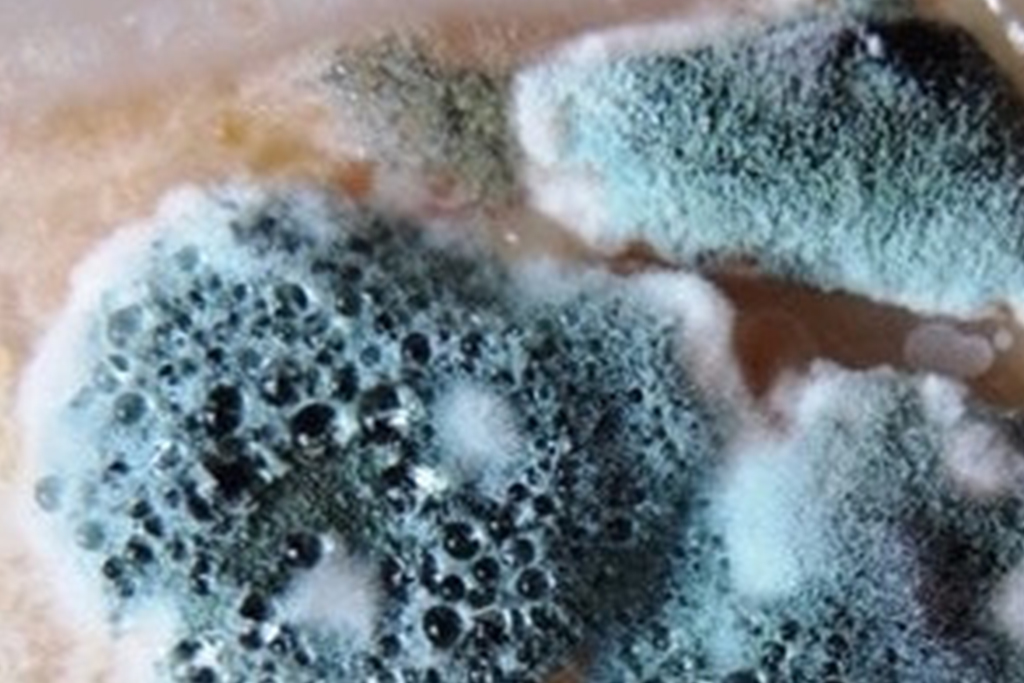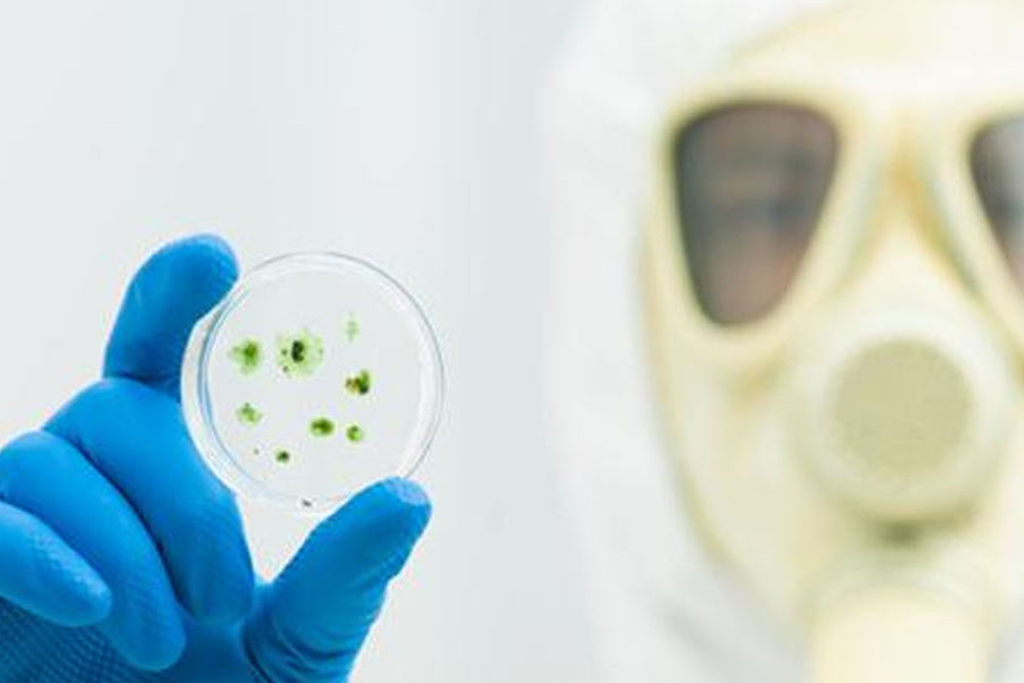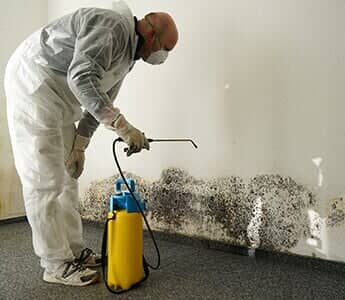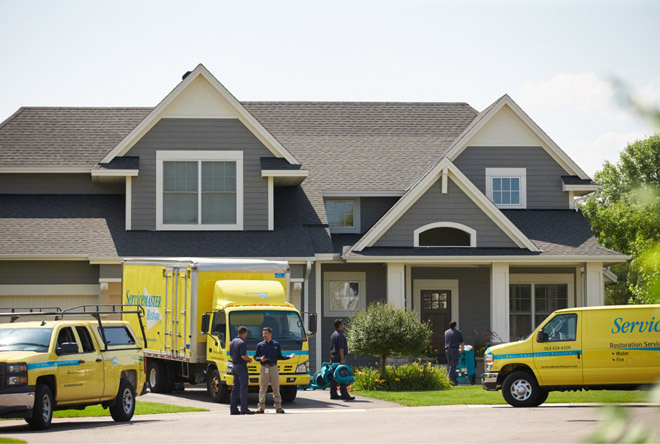Mold Removal & Remediation in Des Plaines
Don’t Let Your Home and Health Be Ruined with Mold!
Mold is present everywhere in nature, but when it finds its way into your home, it can be a major problem. At ServiceMaster, we use infrared technology and special chemicals to help remediate the mold and protect your home by performing mold remediation services.
We know how to stop a growing problem. We know how to identify and eliminate the source of what has caused the mold, and implement the proper processes in order to eliminate mold growth. We can clear the contamination while restoring your peace-of mind.
Call ServiceMaster Disaster Clean up Services at (847) 957-9746 to learn more about our mold remediation services in Des Plaines.
How We Can Help
Regardless of the cause, ServiceMaster experts provide a comprehensive mold remediation process to help eliminate the problem by:
- Locating the mold and the water sources that feed mold
- Assessing the damage caused by the mold
- Isolating & containing the mold by using techniques like physical barriers & negative air pressure to prevent it from spreading
- Capturing, filtering & scrubbing microscopic mold spores from the air
- Removing mold with antimicrobial & anti-fungal treatments
- Disposing of mold-infested porous materials
- Cleaning, sanitizing & deodorizing belongings as needed
- Repairing & reconstructing damaged areas to restore your home
How Much Does It Cost?
When it comes to having mold removed from your home, one of the things you’ll need to consider is the remediation cost. Of course, the safety and health of your family is more important than the price you’ll have to pay to remove the mold, but it’s still a good idea to be aware of how much something might cost you.
The remediation cost of a crawlspace can really vary. It could average as little as $500 or as much as $4,000. If the attic and wall ducts are involved, the cost for those generally ranges from $2,000 to $6,000. If your home has been flooded and the mold is all throughout it, there is much more that has to be done. This could drive your remediation cost up to $10,000 to $30,000 – and it could even go higher, depending on the size of your home.
When you’re considering insurance, make sure you get something that will cover at least part of the remediation cost if you live in a flood zone. Most consumers don’t have that kind of money to spend out of pocket.
What Is Mold?
Molds are organisms which are neither plant nor animal. They are part of the fungi kingdom. Unlike plants, molds do not get their energy from the sun through photosynthesis. In fact, the sun’s ultraviolet light inhibits mold growth. Molds also digest or “eat” the material they are growing on. The role of mold is to break down decaying organic matter such as dead plants, leaves or dead animals.
Mold is more than a smelly nuisance. For homeowners, it can damage their home and present a serious health concern. Mold is a problem most homeowners rarely think about and hope to never experience. It can grow almost anywhere, indoors or outdoors. Mold grows best in damp, warm conditions, such as basements, showers or decks. And, it can grow quickly.
Living under conditions where high mold levels are present can be dangerous. Not only can mold cause adverse health effects, but left unattended, it will continuously grow and can damage and destroy whatever material it comes into contact with. People are exposed to mold through skin contact, inhalation or ingestion, which may cause mild to severe allergic reactions, depending on a person’s sensitivity.
Most experts recommend a professional mold remediation services company when elevated mold levels are detected. Our professionals are specially trained to isolate and treat mold-affected areas to avoid contaminating adjacent spaces.
The ServiceMaster mold remediation team works with nationally-recognized testing facilities, and can provide mold inspection, laboratory analysis, and written remediation plans at a reasonable price.
Consider the following facts:
- Mold is present almost everywhere, indoors and outdoors.
- Mold spores are microscopic and float along in the air, and may enter your home through windows, doors, or AC/heating systems or even hitch a ride indoors on your clothing or on a pet.
- Mold spores thrive on moisture. Mold spores can quickly grow into colonies when exposed to water.
- Before mold remediation can begin, any sources of water or moisture must be addressed. Otherwise, the mold may return.
- Let your nose lead the way. Mold often produces a strong, musty odor and can lead you to possible mold problem areas.
- Even higher-than-normal indoor humidity can support mold growth. Keep indoor humidity below 45 percent.
What Is Black Mold?
Stachybotrys chartarum is the type of mold often called “black mold” or “toxic mold”. Sensational news reports warn about the dangers of black mold and these stories can be alarming and confusing. Any mold in your home should be treated with caution – stay out of affected areas and don’t touch or disturb the mold.
Since many types of mold can produce allergens and irritants, you should contact a qualified mold remediation company regardless of the color or type of mold. If you suspect that you have a mold problem, contact ServiceMaster mold remediation services immediately.
"Mold Removal" vs. Mold Remediation

Since microscopic mold spores exist naturally almost everywhere, indoors and outdoors, removing all mold from a home or business is impossible. Some restoration businesses advertise “mold removal” and even guarantee to remove all mold. This is a fallacy.
A qualified restoration company understands the science behind mold and mold growth. ServiceMaster Restore DCS professionals have the training and expertise to remediate the mold in your home or business. Mold remediation focuses on getting mold levels back to normal, natural levels.
Every mold damage scenario is different and requires a unique solution, but the general mold remediation process stays the same.
Get in touch with our Des Plaines mold removal experts by calling (847) 957-9746 today!
Frequently Asked Questions
Why Is Mold a Problem?
Many people aren’t aware that mold can cause serious structural damage to homes and businesses, which, if le. undetected, can cause a property to lose value and/or require significant repairs. And if you have ever suffered from allergies, exposure to molds can often cause nasal stuffiness, eye irritation, wheezing, skin irritation or even more severe reactions.
Please also be careful for sharp objects (knives, broken glass, and sharp objects of any kind) that will cut you. Hypodermic needles can also be a concern. Don’t hesitate to contact us for assistance in hoarding clean up.
What Does Mold Need in Order to Grow?
Mold needs a moist environment, temperatures above freezing and a food source, which could be leaves, paper, dirt, wood or other building materials. Mold is more likely to be found in damp, dusty spaces or areas with stagnant air.
How Can I Tell If I Have Mold?
If you see mold growth or water stains, a mold test can help identify related microbial activity. You can also look for areas where water leakage has occurred, such as roofs, pipes, ceilings or walls. Musty smells may also indicate the presence of mold.
What Are the Effects of Mold on My Health?
Most mold symptoms are caused by mold allergies. When you breathe in mold spores your immune systems responds by creating allergic reactions. These reactions are the immune system’s defense against foreign particles entering the body.
The more a person is around mold the more sensitive to it they will become. This means that they can end up unable to tolerate being around even small amounts of mold. Their allergic reactions will also become more and more severe.
Symptoms that mold allergies cause include:
- Cold or flu like symptoms – Coughing, sneezing
- Sore, irritated, itchy throat
- Blocked nose, Itchy nose, Runny nose
- Sinus congestion and headaches
- Difficulty breathing, shortness of breath
- Wheezing
- Irritated, itchy skin
- Skin rash, hives
- Watery eyes
- Red, bloodshot eyes
- Itchy eyes and ears
- Hair loss, baldness
- Hay fever symptoms
How Can I Prevent the Growth of Mold in My Home?
The most effective means to keep mold in check include keeping the humidity level of your home at 40–60 percent, using an air conditioner and/or dehumidifier during humid months and in damp spaces like basements, and always utilizing exhaust fans in bathrooms and kitchens, along with dryer vents outside your home. Lastly, if there are leaks in your roof, walls or plumbing, it is important to repair them as soon as possible.
If I See Mold, Couldn't I Just Treat It Myself With an Off-the-Shelf Spray?
Most non-professional treatments simply cover up odors and possibly kill off surface molds or impurities temporarily. Unfortunately, they can’t penetrate deeper into walls and other areas where molds and mildew originate.
Furthermore, such sprays or aerosols often contain harsh chemicals or synthetic ingredients that could be harmful when ingested. Unless the feeding ground of the mold spores is discovered, so the mold can be eliminated at its source, the problem will not be fully resolved.
What Kills Black Mold on Wood?
Have you discovered black mold in your home? Black mold is also known as toxic mold, and if it is left to continue growing inside a home, then it may lead to severe respiratory and other health issues. If the growth of mold is not severe, you may be able to remove it yourself if you have the right supplies.
There are a variety of products that will kill black mold and its spores, however, it is most likely that it will cause permanent damage to any wood in your home -- flooring, furniture, and more. The type of products you need to remove black mold on wood will depend on the type of wood surface that you are treating. Overall, be sure to use products that are not corrosive and do not contain abrasive chemicals.
Note: When removing black mold from wood, use precaution. Black mold is associated with serious respiratory problems and skin irritations.
When getting rid of black mold on wood remember the following:
- Wear a face mask or respirator that is rated to protect against mold spores that may already be in the air or get dispersed in the air while you are working.
- Put on clothes that cover your entire body -- a long-sleeved shirt and pants are highly recommended.
- Use safety goggles to protect your eyes.
- Use rubber gloves to protect your hands from the cleaning solutions and mold. If you take a break, throw out the gloves you are using and put on a new pair when you begin work again.
If you or your loved ones at home have shown symptoms of respiratory issues, there may be mold in your home. To ensure your and your family’s safety, it may be necessary to leave it to the mold removal experts. At ServiceMaster Disaster Clean up Services, our specialists handle mold growth throughout Illinois. Contact us today to schedule mold removal today!
When Does Mold Need to Be Handled by a Professional?
Most experts recommend a professional remediation company when elevated mold levels are detected. Remediation professionals are specially trained to isolate and treat mold-affected areas to avoid contaminating adjacent spaces.
Some Molds Have the Reputation of Being More Dangerous Than Others. Is Identifying the Mold Important?
Sometimes you will hear terms like “toxic mold” and “black mold” used to refer to molds. While identifying the type of fungus or mold may be interesting, it doesn’t affect the course of action. If mold is present, the CDC has strongly recommended that it be removed by professional mold remediation services, no matter the type.


